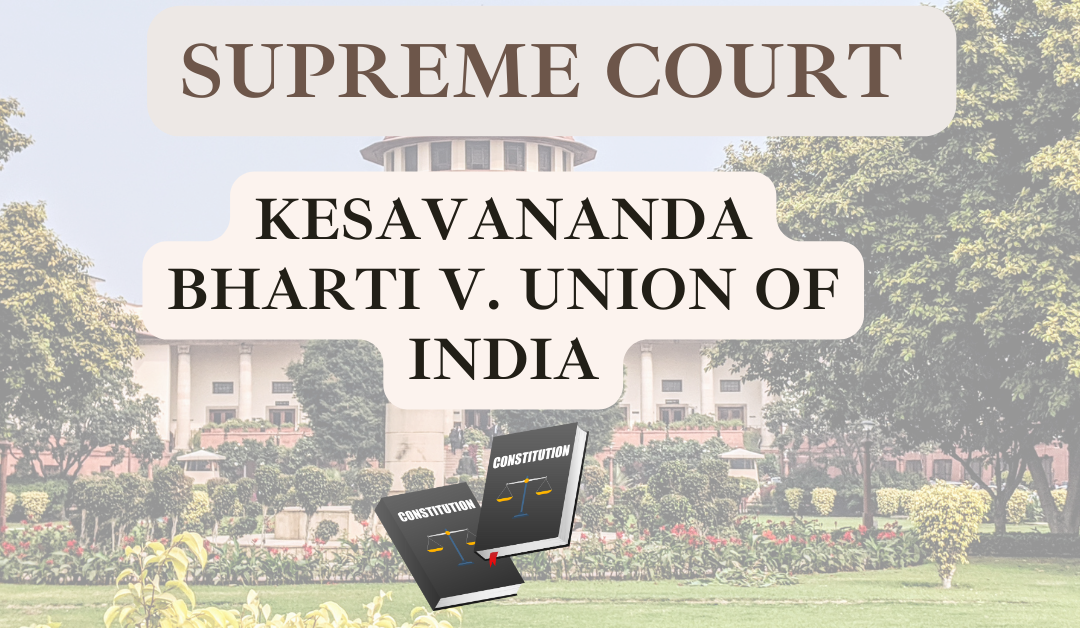A Ready Reckoner
BENCH
Hon’ble Mr. Justice S.M. Sikri, A.N. Grover, A.n. Ray, D.G. Palekar,H.R. Khanna,J.M. Shelat,K.K. Mathew, K.S. Hegde,M.H. Beg, P. Jaganmohan Reddy,S.N. Dwivedi, Y.V. Chadrachud
Facts
In this case Kesavananda Bharati, the lead petitioner was the leader of the Edneer Mutt, a religious sect in Kerala’s Kasaragod district. Kesavananda Bharti had some plots of land in the sect that he owned in his name. The Kerala State government enacted the Land Reforms Amendment Act in 1969, which conferred upon the government the right to acquire some of the land owned by Edneer Mutt, of which Kesavananda Bharti was the leader. On March 21, 1970, Kesavananda Bharti filed a writ petition in the Supreme Court under Article 32 of the Indian Constitution to enforce his rights guaranteed by Article 25 which confers the right to practise and propagate religion, Article 26 which guarantees the right to administer religious affairs, Article 14 provides right to equality, Article 19(1) (f) provides freedom to acquire property, and Article 31 which provides for Compulsory Acquisition of Property. While the petition was still pending the Apex court, the Kerala government passed another act, i.e., the Kerala Land Reforms Amendment Act 1971.
ISSUES
Whether the 24th Constitutional Amendment Act 1971 is constitutionally valid?
Whether the 25th Constitutional Amendment Act 1972 is constitutionally valid?
What is the extent to which the Parliament can exercise its power to amend the constitution?
PETITIONER’S ARGUMENTS
The petitioner contended that the Parliament cannot amend the Constitution in a way they want to as they have a limited power to do so. The Parliament cannot exercise its power to amend the constitution by changing its basic structure. The petitioner pleaded for the protection of his property under Article 19(1)(f) of the Indian Constitution. It was also argued by him that the 24th and 25th Constitutional Amendments violated the Fundamental Right which was provided under Article 19(1)(f) of the Indian Constitution. Fundamental Rights are rights available to citizens of India to ensure freedom and if any Constitutional amendment takes away such right then the freedom which is ensured under the Constitution to its citizens will be deemed to be taken away from them.
RESPONDENT’S ARGUMENTS
The respondent was the State. The State contended that Supremacy of Parliament is the basic principle of the Indian Legal System and so the Parliament has the power to amend the Constitution unlimitedly. State also contended that in order to fulfil its socio-economic obligations which have been guaranteed to the citizens of India under the Preamble, it is important that the Parliament exercises its power to amend the constitution without any limitations
JUDGEMENT
The 13-judge bench by the majority of 7:6 held that the Parliament has the authority to amend any clause of the constitution as long as the amendment does not violate the Basic Structure of the Constitution. However, the apex court upheld the entire 24th Constitutional Amendment Act 1971 but considered the first part of the 25th Constitutional Amendment Act 1972 to be intra vires and the second part to be ultra vires.
Written by Sneha Verma,
2nd Semester, B.A. (LLB), Lloyd Law College
Yet another Lawyer who happens to indulge in the gratification of reading and writing the Language of Law.
Yet another Lawyer who is trying to be better than yesterday.
